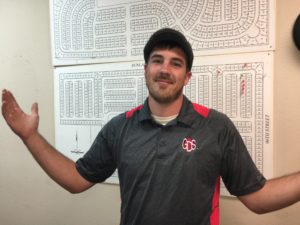SILVERIDGE
And that brings us to Silveridge. “We had a successful split of the park at Silveridge,” Tim says. He added, “I know there are some residents who disagree about it being a success. What happened is that there were spots where the signal was much stronger or weaker. We had an engineerng firm do modeling for the park so we knew where the pedestals should be and where the nodes, or feeds, should be. The result was that we got the signal evenly distributed, and when we did, it revealed that some of those who’d had the stronger signals had underlying issues.”
What remains to be done at Silveridge?
“A lot of digging. A lot of cables need to go underground and many of them need to go under streets.”
I asked if that meant digging up the streets and Tim explained that it didn’t; rather, they dig a hole four to six feet deep on either side of the pavement, then they send through “the missle,” a boring device that creates a 2-3 inch tunnel. They then install flexible conduit that will carry the cable line and will allow for fairly simple repairs in the future.
And, speaking of digging, the crews are also digging up all the pedestals (the green or white boxes), all 260 of them. They check the fittings, resplice the connections and then weatherproof them.
That sounds like a lot of work. A whole lot.
And that brings us to the big questions:
What should residents at Silveridge expect to see going on? And, how long will the work take?
“We’ll be starting with the south side of the park, then we’ll do the north. Given the heat, we like to start work early. A typical workday is 5AM to 3PM. Our goal is for the all the construction work to be finished in two months. That’s a rough estimate. I hope it will be sooner. We’ll work seven days a week if we need to.”
Will there be outages?
“Yes, when we are replacing the pedestal or re-splicing cables, the signal will be out. But that will only be for half a day. We shouldn’t need to have it off overnight.”
Will residents get some warning of when it will be off?
“Yes. We will give people a heads-up a week before. They’ll get a notice in the mailbox.”
What about people who have problems or need help?
“We will continue to do trouble calls and installs. If someone has issues, or they’ve made a change – for instance, they added an Arizona room and want TV out there — or if someone is moving in, they just need to go to the Front Desk and fill out a form and we’ll get in on our work schedule.”
So, how much confidence should residents feel about the work being completed and the HDTV and Internet becoming “just stuff that works”?
First, Tim seems to be the right one for the job. He says,
“We know this isn’t just about people watching their favorite TV shows. We know that there are people trying to pay bills online, or communicate with family, or with doctors, and we have people whose medical devices are connected to the internet. When we first got here and I saw reports involved medical devices, I cancelled everything I had scheduled for that day and took all those appointments myself. I wasn’t about to let that go.”
And he adds, “Once we get it stable, it will be stable for years. It will be at least a decade before any of the material starts to degrade.” (If only I could say the same about myself.)
GM Rhonda Ciacco added this:
“The TV and Internet problems have been a headache for everyone. And I want to thank all of our residents for being so understanding. Sure, we’ve had a few who’ve taken out their frustrations on those who work here, but that’s rare. We have some of the best people in the world at our parks and they understand that when you try to make improvements that not everything goes as planned. But we’re getting there and the result is going to great.”
|





